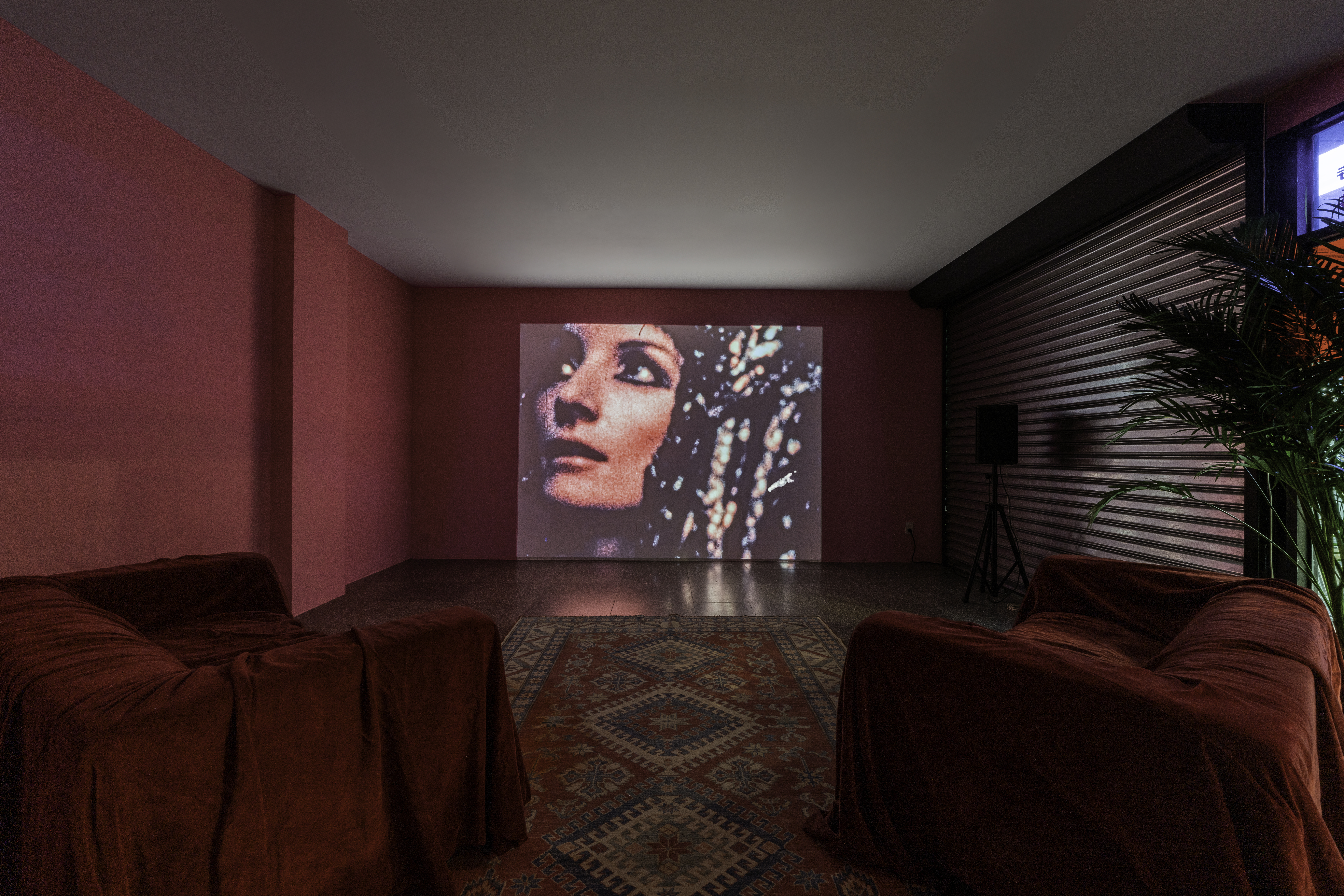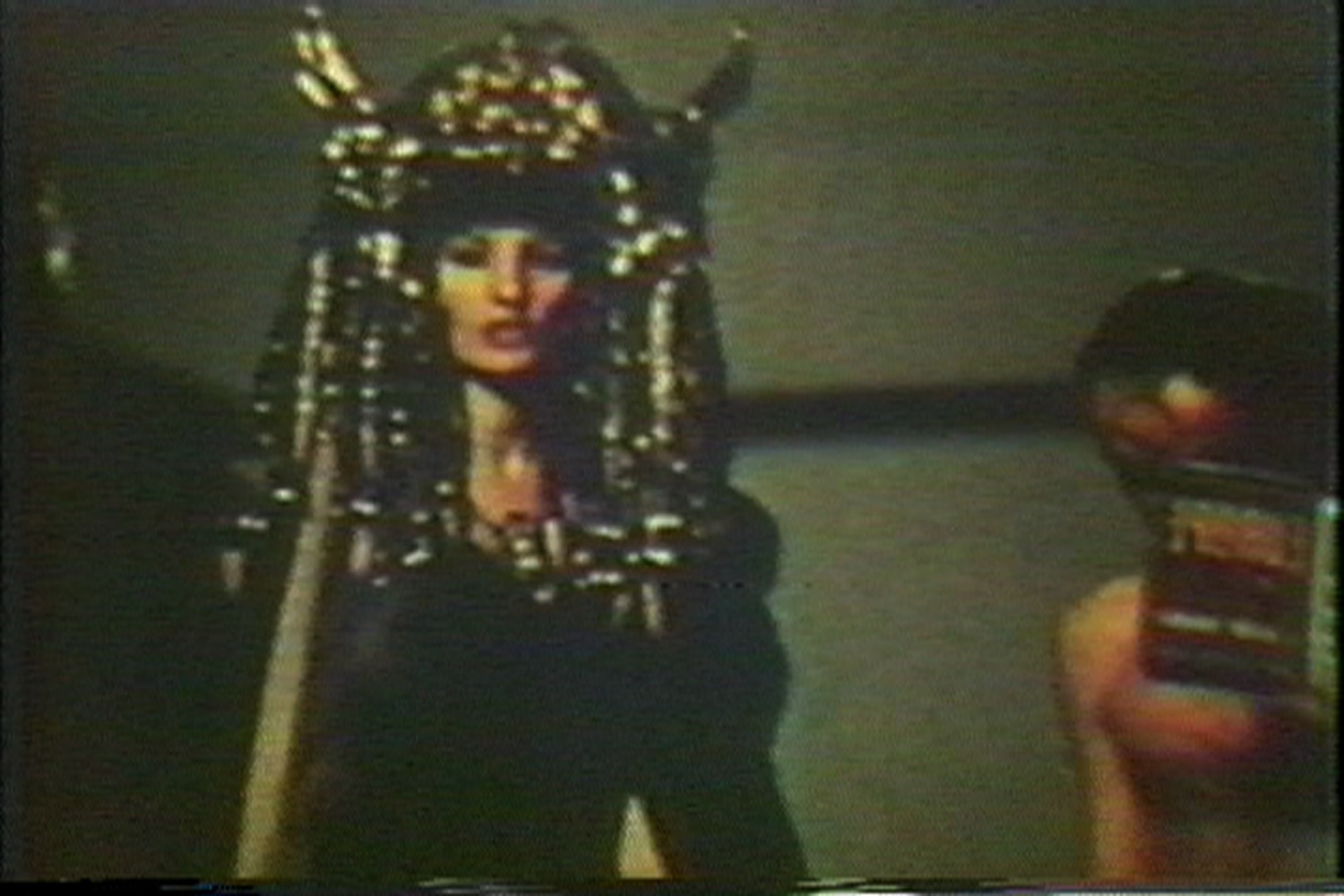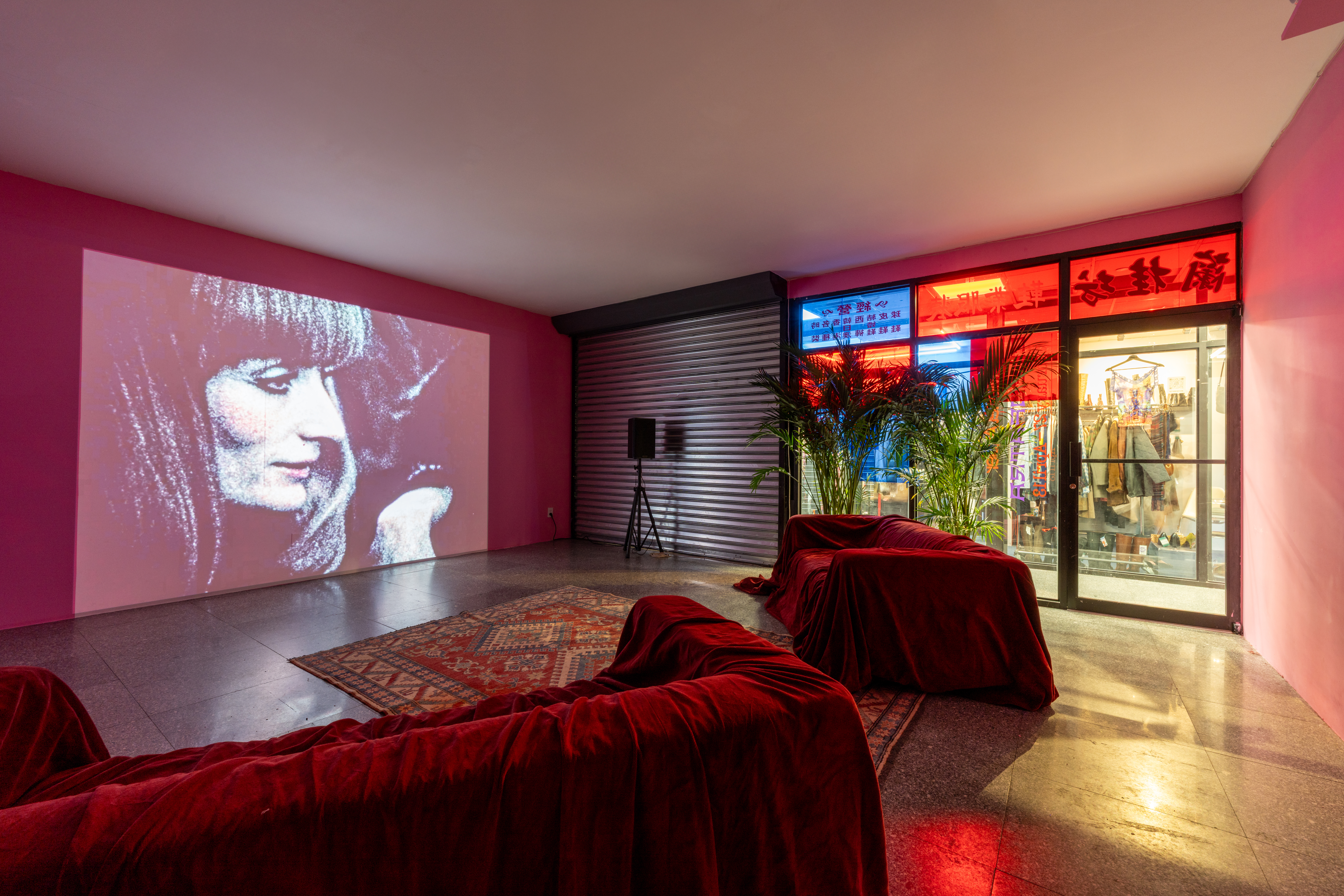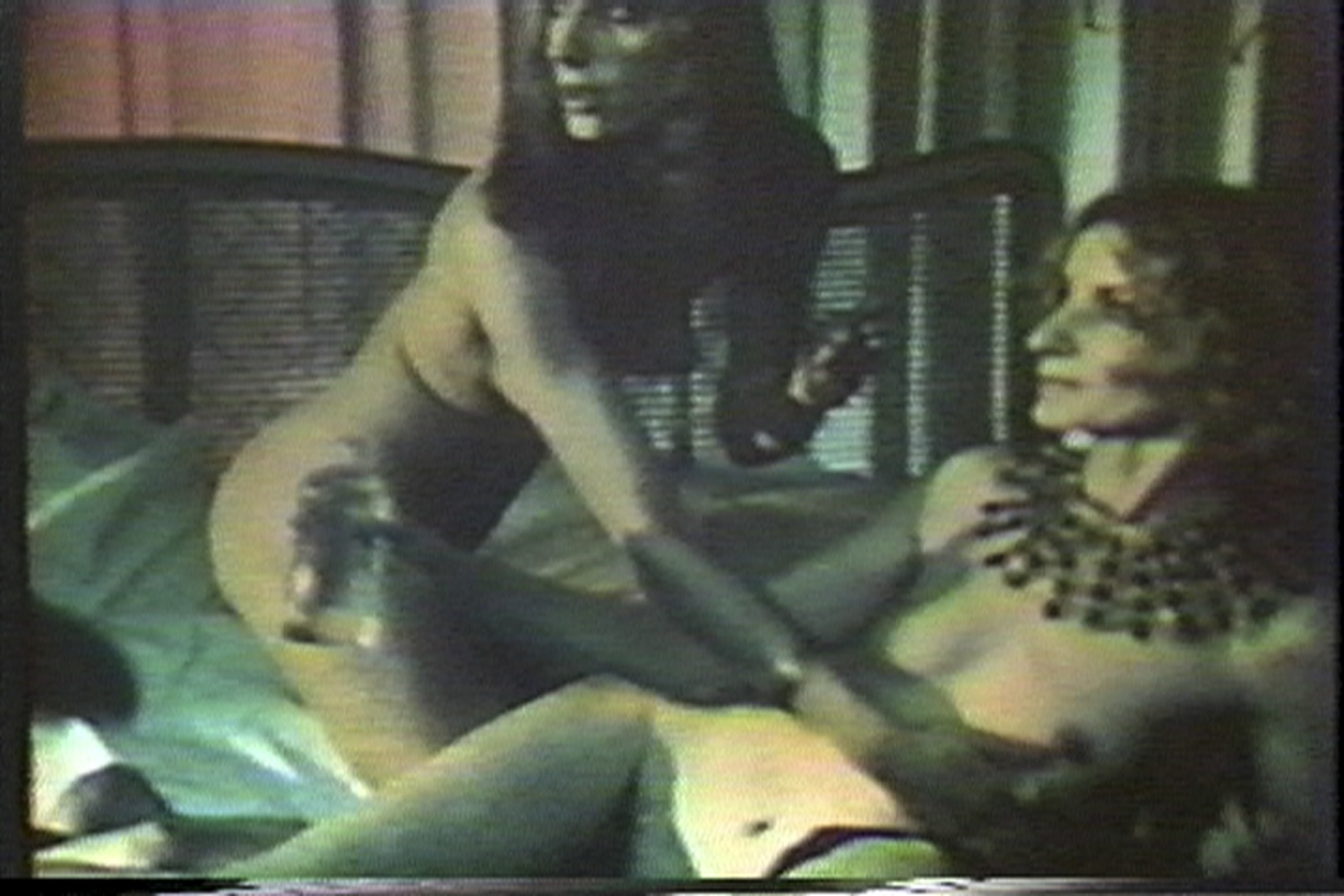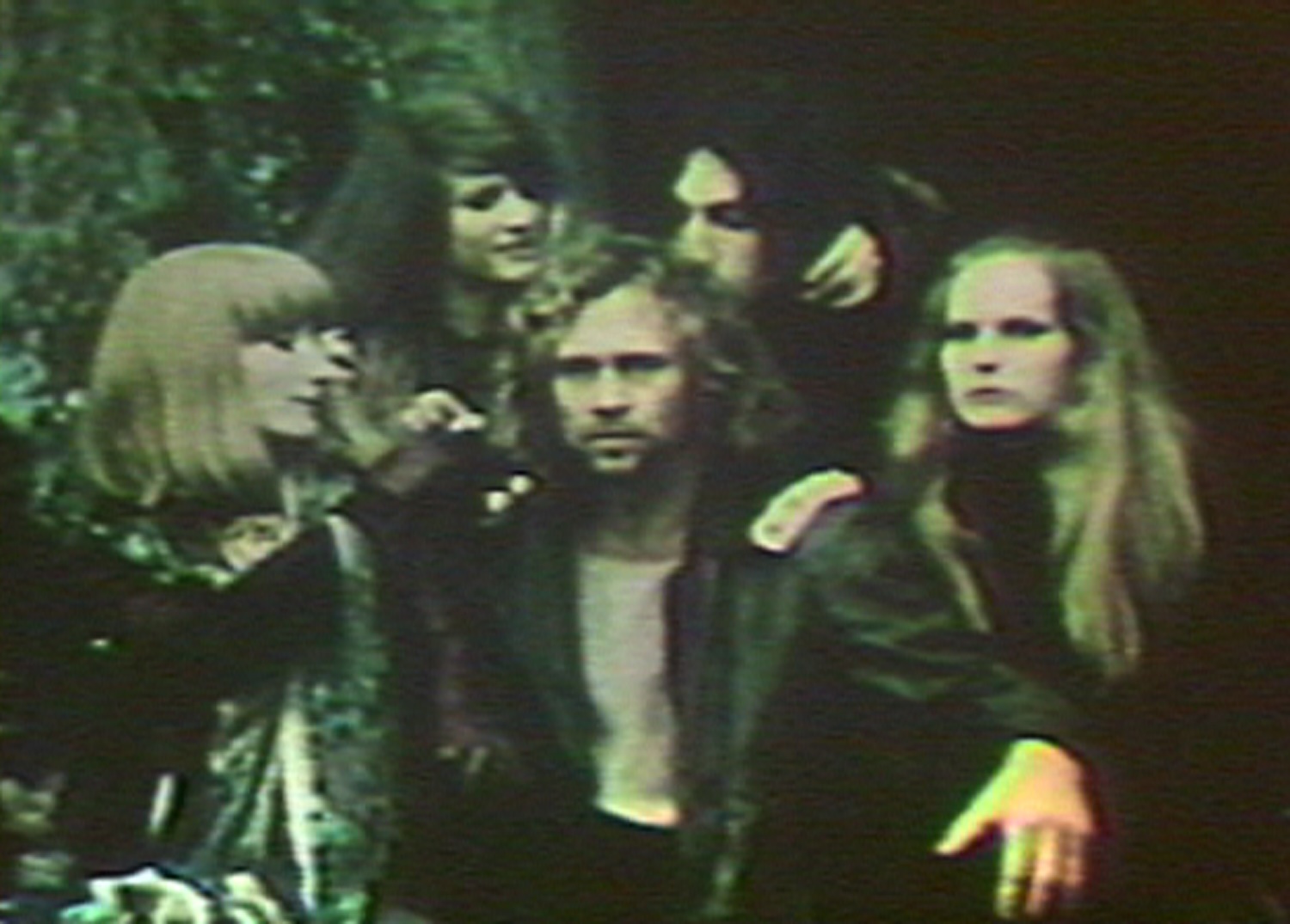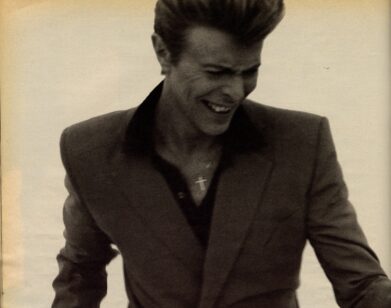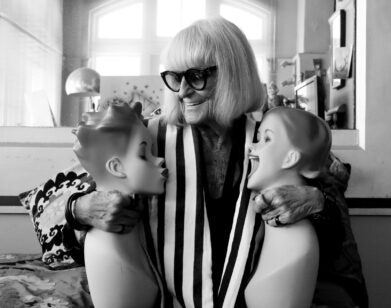ICON
“I’m Not Romantic About the Past”: Michel Auder on 60 Years of Documenting New York’s Underground
Last Monday, I walked up seven flights of stairs to find 80-year-old artist Michel Auder at work in his Manhattan studio. Sometimes called the “video laureate,” Auder is known for his filmic poetry. Born in France, he was always captivated by the New York scene, traveling between the two places. His commitment to video began as soon as handheld cameras became widely available. His first: a Sony Portapak in 1969. And in the 60 years since, he has captured his intimate view of New York’s underground film and art worlds. Now, however, he works primarily on his phone.
Auder’s first film, Keeping Busy, shot on the heels of Warhol’s Blue Movie in 1969, followed its stars: Viva, Auder’s lover and soon-to-be wife, and Louis Waldron as they went about their day-to-day lives. His sophomore project, Cleopatra, first released in 1970, is now on view at OCD Chinatown, where it will be screening for the next six weeks. Also starring Viva, Auder’s muse of sorts, the movie takes the ancient tale of the Egyptian Queen and Marc Antony and reimagines it with Warholian actors in upstate New York and Rome. (“Lower your voice, this is The Colosseum,” goes one of many clever lines improvised by its colorful cast). To mark the occasion, Auder and I spoke about TikTok casting, getting up early, life-changing late nights of yore, and never being romantic about the past.
———
STEPHANIE LACAVA: You were saying about your phone?
MICHEL AUDER: I always had a camera on my phone at the beginning of 2000, but then one day I looked into my phone and I realized I was making films. So I made my first film from my phone, and then I discarded all the cameras and kept using the phone from 2000.
STEPHANIE LACAVA: No Portapak? Nothing old school?
AUDER: No. They’re with a friend of mine in Ohio.
LACAVA: I read that the film that you made with Viva when you met her and Warhol is lost. Is that true?
AUDER: Keeping Busy? I have it.
LACAVA: Oh, some people document it as lost. That was 1969, right?
AUDER: Yeah.
LACAVA: And this is when you were transitioning and when Warhol came to make the other movie. How did you end up pulling the same two actors on the heels of the other film?
AUDER: I met Viva and Nico in the street at 4:00 in the morning.
LACAVA: No way. What were they wearing?
AUDER: Some long coat. Nico always wore big robes like she was a priestess or something. They were going to a party at 4:00 in the morning and then they said, “Come with us.”
LACAVA: You must’ve been very charming.
AUDER: I was just a big fan. They took me in.
LACAVA: And the rest was history.
AUDER: Yeah. Now I was asked [to make] Cleopatra. I’m very interested to see now after a long time how people are going to react.
LACAVA: Do you have any reservations about it being shown in the gallery context where you know people won’t stick around?
AUDER: I don’t give a fuck. I have respect for the film, but not the way people want to see films.
LACAVA: Have you been to an AMC cinema lately?
AUDER: No, but I was in Poland and my friends said, “I want to see Babygirl.” And I said, “Okay, let’s go.” So I went to the cinema, finally.
LACAVA: What’d you think?
AUDER: I thought it was really conservative. One more time, the woman does wrong and she comes back to her husband. It’s kind of like real Hollywood.
LACAVA: You know, some people think that movie’s radical.
AUDER: Yeah, of course. I wouldn’t be surprised. But what do they know about radical?
LACAVA: Tell me.
AUDER: You want to see radical? We’ll show them. Hollywood manipulated it. Actually, the sex scenes are pretty good because I think they’re copied on TikTok. Women take their pants off, all kinds of shit.
LACAVA: Do you have TikTok?
AUDER: Yeah, of course. My work is already very modern right now. They’re doing the same thing that I do. In TikTok the content is not always the best, but the actors are fantastic. There’s no more actors in Hollywood. The real actors are on TikTok. They’re magnificent. It’s insane what they do.
LACAVA: You should contact one of them to be in one of your movies. Would you ever do that, or is it always just your inner circle?
AUDER: I work by myself. Like a one-man band.
LACAVA: Come on, you’re a filmmaker. That’s the opposite of a one-man band.
AUDER: Yeah, but I do everything by myself. In the end, I’m editing. It’s a nightmare. I’m like a secretary to my work. I sit in front of a fucking screen like everybody else.
LACAVA: So you’re meeting Nico and Viva on the street. You make the film. And—
AUDER: When I finished Keeping Busy, Agnes Varda called Viva. She was making her first film in Hollywood, Lion’s Love, and she wanted Viva to star in her film. And Viva said, “I’m not going there without my boyfriend.” So Agnes had to organize flights for me and we went down to Hollywood and she made the film. We went to dinner at [Roger] Vadim and Jane Fonda’s.
LACAVA: Of course. What did you think of his character?
AUDER: They were great. Polanski was there with Sharon Tate, and a week later Sharon Tate got murdered.
LACAVA: A week later?
AUDER: Yeah, she was pregnant and everything. Jane Fonda served hashish cake.
LACAVA: So you guys got stoned?
AUDER: We got really fucked up. Viva was upstairs with Vadim playing with the electric toothbrush.
LACAVA: Is that a euphemism?
AUDER: No, no. That’s what was happening. And then when everything was done, we drove back and decided we would get married. That’s it.
LACAVA: Really?
AUDER: Yeah. Jane paid for our hotel in Las Vegas and we got married.
LACAVA: Did you exchange any kind of ring?
AUDER: We did it for a film. I had a real fight with Viva, though. I said, “We got married just to make a film. We didn’t really get married for—”
LACAVA: Oh my god.
AUDER: We didn’t get along, anyway. She got pregnant and we had the baby, which reconnected us for a while. We should have been separated before she got pregnant, but the baby brought us back together.
LACAVA: That’s a good story. I’m sure she wasn’t thrilled you were filming her giving birth, which I read about.
AUDER: She organized it. Viva is a serious troublemaker. She would do anything. She had affairs, I had affairs, why not? No doctor at that time would let you film a birth, but she just talked to the doctor and found one that said it was okay.
LACAVA: Oh, you have that pic of David Hammons up there. Is it just a card?
AUDER: Yeah, I filmed him in Rome in 1989 and made a video portrait of him.
LACAVA: Do you guys still talk?
AUDER: We talk, but not often. He’s very complex. I really love him and we’re friends. If we see each other, we kiss. But I wouldn’t bother him. I’m not romantic about my past.
LACAVA: So who are your friends now, the ones you’ve had forever?
AUDER: I have many friends, but I only see a few regularly, like Martos, Servane, and Natalia Sielewicz, the curator in Warsaw. If I name some and forget others, it’s ridiculous. I refuse to categorize friends into a hierarchy. It’s strange for me. But I do talk to people regularly every day.
LACAVA: That’s good. Do you get up really early?
AUDER: Yeah, now I do. In the ‘80s and ‘90s I used to go to sleep at 5am and work at night, going out to clubs to meet people.
LACAVA: Were there a lot of drugs? When did you stop?
AUDER: I stopped taking heroin in ’86. It was very difficult. I made a movie called My Last Bag of Heroin (For Real). From ’86 to 2002 I had to go to NA meetings to not use. I always wanted to use it when I felt bad, but now I don’t give a fuck. You could give me heroin and I wouldn’t use it. The pain it brings after the pleasure is not worth it. Heroin saved my life at one point when I was in despair, but you pay a very high price. I worked with it and made my videos. But it was incredibly painful to quit. I always worked, though, and that’s what saved me. I have an obsession with making films.
LACAVA: Do you remember how young you were when you first felt the film addiction?
AUDER: I became a fashion photographer at 17 before the army. The army took me and I lost my studio. I was alone in Paris with no family.
LACAVA: I wonder if your war experience, being embedded socially, led to you documenting the New York social scene the way a war photographer would. Is there anything to that?
AUDER: I just refused to comply. I was upset about losing my studio that was doing well. The only thing I got out of it was becoming extremely anti-French government politically. I wasn’t shooting the Algerian war, it was already finished. They sent me there as punishment for not complying. I escaped to Algiers and stayed away for 15 days.
LACAVA: Are you reading poetry right now?
AUDER: Right now I’m not reading that much.
LACAVA: The reason I ask is because you’re always referred to as the video laureate, the poet’s filmmaker. You make films like poetry.
AUDER: I was raised with poetry. After being alone at 17, I dropped into a jazz bar called the Club Saint-Germain. Thelonious Monk and everybody played there. The owner was a woman who was in the Maquis during the war, and the barman, Patrice, was a poet who was also forced into the Maquis when he was young.
LACAVA: You used cut-up bits of Rimbaud in the film you made with Donna Haraway’s writing, right? What was that called?
AUDER: Mixing up the Medicine. I was also introduced to Rimbaud early on. I love his poetry, but translated into English, it makes no sense. The words get lost in translation.
LACAVA: Critics often talk about the theme of screens in your work. Do you watch television?
AUDER: No, I don’t watch TV. I used to watch films all the time but not anymore. I went to the theater recently to see Licorice Pizza because my friend wanted to criticize it and invited me. I realized I hadn’t been in a movie theater in 15 or 20 years.
LACAVA: Do you miss it at all, the experience of going to the theater?
AUDER: Not really, no. I’m so focused on making my own films and art that I don’t feel a strong need to consume other cinema anymore. The creation process is what drives me.
LACAVA: That makes sense, given how prolific you are. I’m always amazed by artists like you who maintain such a singular focus and vision over decades.
AUDER: Well, it’s an obsession in many ways. I can’t imagine my life without constantly filming, editing, and thinking about how to translate my experiences and the world around me into video art. It’s like breathing for me.
LACAVA: You’ve certainly created an incredible body of work by following that instinct. I know you may not love overanalyzing it, but your films have inspired theory about the poetics of the screen, the camera’s gaze, and the line between art and life.
AUDER: I appreciate that my work has sparked those conversations, even if I don’t always participate in them myself. For me, it’s a very intuitive process. If it leads to deeper reflections from others, that’s great. But in the moment, I’m just following my own strange compulsion.
LACAVA: Your work invites us into an intimate, unfiltered, and unexpected way of seeing.
AUDER: Thank you, Stephanie. The pleasure is mine.
LACAVA: So you don’t ever stream anything on your laptop?
AUDER: Yeah, I do. But not films. Films depress me. They make me cry, they make me anxious. You have to go through people crying and being in pain and all that stuff. My life has been like this, so why do I want sit in front of a fucking movie? And film has changed. The film from the 20th century that influenced people like me is gone. The new generation aren’t interested in the same way. They might film themselves. It’s like being a writer—untill 1900, nobody wrote anything except maybe church people. Then in 1900, we all became writers. In 2000, we all became filmmakers.
LACAVA: Did you see Godard’s last film with all the cut-ups? It expressed similar sentiments to what you’re saying.
AUDER: No, but his films from the ’60s were very influential to me.
LACAVA: Who else would you name as influential?
AUDER: Godard and others validated me, because I was already making films in my own weird way. People said what I was doing in 16mm wasn’t film. But seeing their work showed me you can make films however you want without paying attention to others.
LACAVA: That’s a good segue. When you made Cleopatra, I read that was when you decided you were done with any kind of Hollywood system. Why?
AUDER: Well, first, it was merging. Like Shirley Clarke, a very important American filmmaker people don’t know as well as Agnes Varda. Clarke is in Varda’s film Lions Love. She became my friend, along with Jonas Mekas. We got interested in video when it was just born. I started filming because I dealt with producers on Cleopatra who became dicks after I finished the film. They took it away from me. So I decided to just make films with video, which you could see right away. But nobody wanted to watch video tapes for many years.
LACAVA: The differentiation you make between film and video would be lost on a lot of people. They use the terms interchangeably now.
AUDER: Absolutely. Film is a piece of plastic with chemicals on it. Video uses metal particles that changed everything. I wanted to make video because the technology made it easier, but the result is the same. I knew video was the future.
LACAVA: Did you have any thoughts on Paul Morrissey’s working relationship with Warhol?
AUDER: Morrissey was the businessman. There was a promise of change at the Factory but those people, including Warhol and Viva, were conservative to the max. You should see what Warhol says on the phone in my film Chelsea Girls.
LACAVA: But on the other end, you love [Pier Paolo] Pasolini. Tell me about your relationship to his work.
AUDER: I like his films. They’re very specific in how they’re written. I never tried to imitate Pasolini, but maybe subconsciously. In my film at Marlborough, I was filming this 17 or 18-year-old boy, the boyfriend of a German artist. He wanted to be seen as a sailor. We went to an island and he performed in his underwear, showed his dick, grabbed a seagull and killed it, took it apart and cooked it. There were millions of seagulls and eggs on this island. He cooked and ate the eggs, filming it felt like a Pasolini scene. But I’m really free of all that. I never went to school, I stopped at 16-and-a-half. Although, I did teach at Yale from 2005 until last year.
LACAVA: I had no idea you taught at Yale. What did you teach?
AUDER: I taught in the film and video department, focusing on more experimental, personal approaches to the medium. It was rewarding passing on what I’ve learned to younger artists, even if my own path was very unconventional. Teaching forced me to examine my instinctive process more closely and break it down in a way I could explain. I always emphasized to students that they need to discover their own way and be open to mistakes and tangents. That’s where the magic happens.
LACAVA: At this point are you interested in going out and seeing what younger filmmakers are doing?
AUDER: I see them online. WangShui is a very good artist. I think at that time it was different than now. People looked at me like I was a freak. Now people know that a camera is a weapon. You can kill people with video, accuse them of things. But I’ve filmed the human race so much that I have everything I need to explain.
LACAVA: Look at this meme that’s going around: “In the surveillance state, we’re all cam girls.” I thought you would like that. Were you the original cam girl in some ways?
AUDER: Somehow, yeah.
LACAVA: My son is really weird about photos. I took a picture of a kid at a basketball game and he said, “Mom, you can’t post that.” Then he’s like, “Don’t take my photo.” They’re the opposite of what you’d think.
AUDER: It’s their problem. I was on a plane and filmed the people next to me. They had a kid, maybe three years old, swiping on a phone. When they’re born with that, maybe they have a different opinion of what’s going on, but Gen Z is well known as the most conservative generation since 1900. Usually generations get more liberal with age, but now there may be a reason for it. Gen Z tells you not to film. You have all these people regulating life with iron rules. They’re uptight but they also do bad things, they just cover it. That’s what we deal with in society. Nothing changes. We’re the same violent humans. If we have to, we will kill somebody. I have no desire to, but I don’t care where I am as long as I’m here.
LACAVA: When you feel anger, now that you have no desire for heroin, what do you do?
AUDER: I don’t really feel angry. I have other stresses, like always needing money. I was never really angry.
LACAVA: What emotion do you find most difficult?
AUDER: I’m just depressed. But I suppress those things by being super happy, too. I really need money, but in two days we have a show and it’ll be fun to have people coming.
LACAVA: Is it strange to watch people watch your work?
AUDER: Nobody’s going to watch my work. How can you watch the work in that small gallery? We just hang around and it’s in the background. If you want to know anything, come back another time.
LACAVA: Have you rewatched Cleopatra in full recently?
AUDER: No, I have no interest. The last time was maybe in the ’90s when it screened at Anthology Film Archives.
LACAVA: It was based on Richard Burton and Elizabeth Taylor’s Cleopatra, right? Was there a script?
AUDER: No, I don’t work with scripts. I used the Cleopatra film as a reference for the actors because of Viva.
LACAVA: What is your direction like?
AUDER: I put people into a situation, then let them be. They think, “Oh, I’m Cleopatra,” so they go into their minds looking for something.
LACAVA: And the styling? I loved how the blonde man had the necklace around his head, and Viva had the threads.
AUDER: I got the jewelry and everything from Kenneth Lane. He sent me an enormous box of stuff. Viva borrowed a few coats from fashion people. It was a drama because they got destroyed, and they were expensive.
LACAVA: It was filmed in Rome and upstate?
AUDER: Yeah. It was a friend of Viva’s who owned a metal forgery. He let me film there upstate.
LACAVA: What happens if no plot emerges or everyone gets stuck?
AUDER: Nobody ever gets stuck. They freak out, but it’s okay. Freaking out is the idea, like the degeneration of government and people. It’s the inside view of being Louis XIV, being Trump, all those parties and things.
LACAVA: Can you tell me about working on the plays with Elfriede Jelinek, who wrote The Piano Teacher?
AUDER: I worked on two plays she wrote about Trump. They asked me to do it. Jelinek is a recluse, she just talks on the phone to the director. I talked to her once in 2017 when we made the first one in Hamburg. This time in December, I didn’t talk to her.
LACAVA: Did you know she’s working on a movie about Bathory with Ulrike Ottinger, starring Isabelle Huppert? I think they’re filming in Austria.
AUDER: She’s great, but I never really talked to her in person. She never came to the productions.
LACAVA: But you said yes because you like her work?
AUDER: I said yes because people understand what I can do. It’s also due to the director. If there is money, I don’t say no. Sometimes people ask me to do shows with no money. Everybody wants to do things with me, they keep asking. Gary Indiana died and everyone wants to borrow my film of him to show in Paris. I don’t want to, because I made that film myself. I carried the camera, set up the lights, did the whole thing for days.
LACAVA: What film?
AUDER: I made film called A Coupla White Faggots Sitting Around Talking, which is based on one of his plays, but it’s mostly improvised after that.
LACAVA: Were you guys friends?
AUDER: Yeah.
LACAVA: But you didn’t want it to be shown?
AUDER: People gain from showing the Gary Indiana film in Paris. They say they’re friends of Gary’s, which is true, but they want to show it in their theater to make a thing for Gary. Gary’s dead—it’s not going to do anything for him. What are they doing it for? Themselves. I’m not giving my films to everybody to play with.
LACAVA: How do you make sure the films don’t end up on the internet?
AUDER: Well, some of them are. If you look at underground sites like Cargo, some of my films are probably there. I don’t care.
LACAVA: For the Cleopatra screening, did you have anything to do with the gallery setup?
AUDER: Yeah, I set up everything myself. I wanted something warm and relaxing, because it’s almost two hours and it’s a crazy film. Have you seen it?
LACAVA: I watched it last night and this morning. One of my favorite lines was when she says, “You should get your pubic hair shaved into a heart.” And then, “You have gray hair.” “Well, you should line it in gray.” “Well then that would be gray on gray.” Where did that come from?
AUDER: That’s Ultraviolet. My actors are amazing. That’s why all the films are so good. The people Warhol used are very complex and troublemakers. They had this fire in them to talk about anything with their own point of view.
LACAVA: And what about the monkeys?
AUDER: There was this guy, a composer, who had an entire zoo in his suite at the Chelsea Hotel. He had a big old-fashioned suite with three bedrooms on maybe the 12th floor, all wood paneled.
LACAVA: Those crazy houses were just friends’ places?
AUDER: Yes, I found them. The first one is the penthouse of the Hilton Hotel, because the producer owned it. He provided this two-floor suite on the top floor for a piece of the cost, like $50,000 a day.
LACAVA: How long was the shoot?
AUDER: A long time, because we went to Rome. We took a plane there and everything. About three weeks.
LACAVA: You did it all in three weeks? How long was the editing?
AUDER: It took some time. But then I was invited to the Cannes Film Festival by Quinzaine des Réalisateurs, and I took the film. My producer sued me because they didn’t want me to take it. They said it wasn’t finished, but I said it was. But then it became a fight because the police were there and they took everything. It became hell. I’m surprised we’re playing it. Suddenly, in the last three months, Cleopatra became a point of interest.
LACAVA: There must be a reason.
AUDER: I don’t know. Maybe people are interested in history.
LACAVA: In general, with regards your own mythology, is there anything you think people misunderstand?
AUDER: Probably, but that’s other people’s problem, not mine. I don’t have this force in me to want my image to be precise. I live in liquid boundaries.
LACAVA: But that’s funny, because you’ve helped create so many people’s images.
AUDER: Yeah, but that’s what I do.


